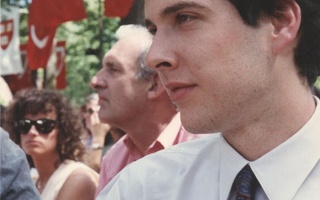The 1960 presidential race between John F. Kennedy ’40 and Richard M. Nixon proved to be a turning point in U.S. politics. With the first televised presidential debate on Sept. 26, 1960, youth became a more prominent feature of American politics, as a candidate’s youthful apperance served as a marker of vitality readily visible to the American public via television sets.
“Television was not full color widescreen and all this kind of stuff,” says Roger M. Leed ’61, then a member of the Harvard Democrats, who watched the debate on campus.
But even on the black and white screen, Kennedy outshone Nixon, whose haggard look and five o’clock shadow reinforced the perception of the older Nixon relative to the youthful Kennedy. Of course, Nixon had been ill just a few days prior and had not fully recovered, nor did Nixon attempt to use makeup to improve his appearance.
“I just thought he looked that way,” Leed says.
Joel F. Henning ’61, who also watched the televised debate, recalls, “Kennedy came across as a much more attractive figure, both physically attractive and in that he was much more eloquent. He made a stark contrast both physically and stylistically to Nixon.”
But those who heard the debate on the radio rather than watching it on television generally believed Nixon trumped Kennedy in the debate, a fact often used to symbolize the television’s growing impact on politics.
Regardless of medium, Kennedy’s popularity among students might have had more to do with his alma mater than with his campaign platform.
“I would say [the political climate on campus] wasn’t so much clearly left-wing, but I think it was clearly pro-Kennedy,” Henning says.
Thomas M. Pepper ’61 agrees, saying Nixon did not stand a chance against Kennedy on the popularity scale.
“Students were predominantly Democratic party adherents. They had this romance with Kennedy.” Pepper recollects. “Nobody liked Nixon. Even Republicans didn’t really like him. He wasn’t quote ‘cool.’ There he was on TV sweating ... Everyone wanted to be like Kennedy.”
Coming out of the McCarthyist 1950s, the specter of communism still loomed over Harvard Yard.
“Sputnik occurred in the fall of ’57.” Pepper reminisces. “It was a big shock: ‘how could the Russians be ahead of us [in the space race]?’ So the big issue was the Soviet Union versus us.”
But despite Nixon’s fervent anticommunism, Leed says that the fear of communism did not permeate the student body.
“They didn’t take this Red Scare nonsense,” Leed says. “We were aware the Russians had atomic weapons, but nobody thought someone was going to take over the U.S. government from within.”
Henning agrees with Leed, saying students generally disapproved of “hysterical anticommunism.”
Read more in News
Harvard Announces Renovation Plans for Old Quincy HouseRecommended Articles
-
 Harvard Drama Takes to a New Stage
Harvard Drama Takes to a New Stage -
 Harvard Introduces First Gen Ed Curriculum, Travels to Nixon's Kitchen Debate, and Hosts Olympic Soccer
Harvard Introduces First Gen Ed Curriculum, Travels to Nixon's Kitchen Debate, and Hosts Olympic Soccer -
 Remedying 'Social Evil' and 'Guilty' Liberal Journalists
Remedying 'Social Evil' and 'Guilty' Liberal Journalists -
 Scott Brown To Join Boston Law Firm
Scott Brown To Join Boston Law Firm -
Obama Goes Full NixonWhile those inside the White House wants to deify Obama as its “North Star,” the potentiality of corruption in his administration must not be overlooked. President Obama must proceed carefully if he doesn’t want to end up with an eerily Nixonian legacy of disgrace.
-
 A.O. Scott
A.O. Scott













